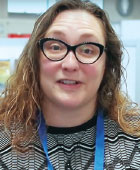Mentoring, Wanderlust, and Whānau: My Journey to Psychiatry
Abstract

Susan Hatters Friedman, M.D., is the Phillip Resnick Professor of Forensic Psychiatry at Case Western Reserve University and the director of the Division of Forensic Psychiatry at University Hospitals of Cleveland, as well as an honorary associate professor of psychological medicine at the University of Auckland in New Zealand. She is the deputy editor of the Journal of the American Academy of Psychiatry and the Law and previously served as chair of the Group for the Advancement of Psychiatry Committee on Psychiatry and the Law. She is also a perinatal psychiatrist.
After studying chemistry, history, and music in undergraduate school, I attended medical school at Case Western. I had not thought that I would study history, believing it was the stuff of old men’s wars with little personal relevance. But the history I studied consisted of the stories of people against the backdrop of when and where they lived. The diary entries of a wealthy woman in the 1860s, the experience of immigrating from India to the United States in the 1900s, life in Salem during the witch trials: these laid a foundation for my interest in psychiatry.
Already a young mother, I wrote my medical school admissions essay about my plans to become a pediatrician working with underprivileged families. I was honored to be accepted into the new primary care track at Case Western, an accelerated clinical program for medical students interested in pediatrics, family medicine, and internal medicine. Ironically, through this carefully conceptualized program in primary care, my interest in psychiatry became paramount. Many of our clinics were longitudinal, and I found that when I did my write-ups for family medicine, what intrigued me most was the psychiatric issues behind some of the presenting somatic complaints (headaches, gastrointestinal problems, and so on). I also recognized that in pediatrics, I particularly enjoyed working with the parents coping with distress in raising their children. I greatly enjoyed my psychiatry rotations and registered for many electives in various psychiatric subspecialties, changing my focus from pediatrics to psychiatry.
For “fun,” in addition to my elective in wilderness medicine (you never know when that will be useful), I took Phillip Resnick’s courses at the law school in psychiatry and the law. Though I now know that he is an internationally renowned teacher, at the time my friends and I signed up, I just thought the course sounded intriguing because I enjoyed reading murder mysteries. A couple of lectures in, I found myself awestruck that forensic psychiatry was an actual job. A generation later, I now am hugely honored to teach in this program.
My beloved and extraordinary maternal mental health mentor, Miriam “Mim” Rosenthal, was one of the only women in her medical school class and has served as a mentor and role model for generations of physicians. She recently was recognized for 55 years of service at Case Western University Hospitals of Cleveland. She has also since served as a model for healthy “retirement” while still teaching medical students in small group exercises through 2018.
Because of staying on at Case Western after medical school and residency, I’ve been fortunate to have mentors who have also become colleagues. My training director, Bob Ronis, is now my chair. Nurturing mentors and a wonderful supportive family helped reinforce my decisions during the grueling years of residency and fellowships as my husband and I raised our two young children.
My husband got his M.D./Ph.D. while we were in medical school together. I greatly admire his work but never imagined I would do research—in my mind, research was all about either killing mice or using huge national databases—until I had the opportunity to work with inspiring mentors including Martha Sajatovic, Sally Horwitz, and Sana Loue.
Interestingly, and unbeknown to me at the time, I had married into the only family where I didn’t need to explain what a forensic psychiatrist is. My husband’s grandfather was the then-young military psychiatrist at the Nuremberg war crimes trials (we have found some of his clever testimony online), and Andy Watson, who was a professor of law and psychiatry at the University of Michigan, is in our wedding photos. I tell my (now-grown) children that I am so fortunate to be able to do the work I love—combining my interests in forensics, perinatal psychiatry, culture, and academics. We are so lucky, every clinical day, to have people entrusting their stories to us.
My clinical and research career in forensic psychiatry and maternal mental health has afforded amazing experiences for me and my family. Because of our wanderlust, we were interested in working internationally and providing a broader perspective for our children, so we pursued living and working abroad in New Zealand. The practice of psychiatry in New Zealand is cultural psychiatry—in a breathtakingly beautiful subtropical archipelago. Thoughtful mentors in New Zealand also encouraged my growth as a psychiatrist. Since returning to the United States, my experiences as a psychiatrist in a different culture have broadened my approach and cultural thinking as I teach others. Whānau (the Māori term roughly translated as “extended family” and used as a metaphor for lifelong friends) and mentors have been most important in my journey. Innumerable, memorable discussions with so many mentors have greatly enriched my medical practice and my life. ■



